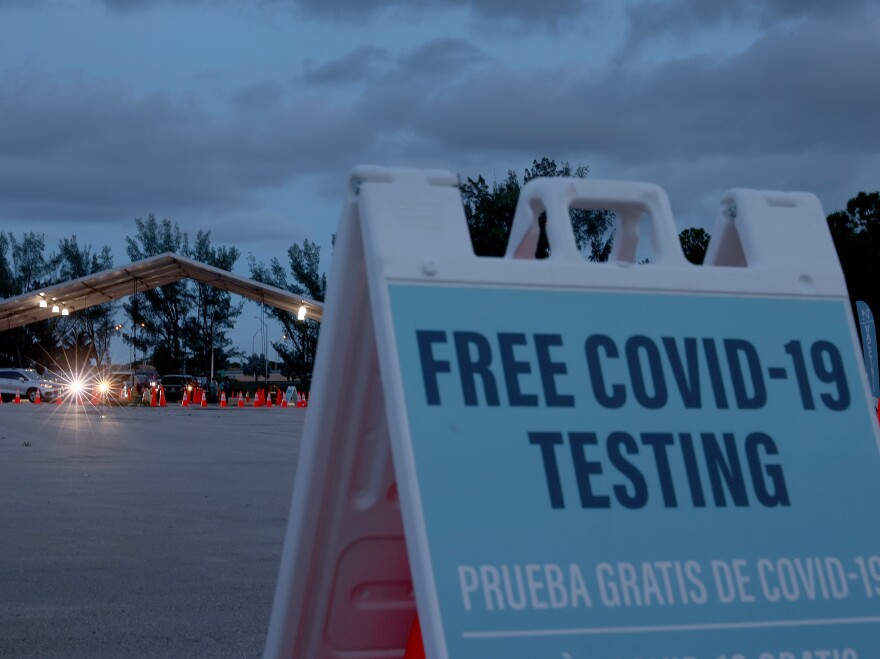Updated November 4, 2021 at 6:53 PM ET
In early September, President Biden announced he was taking steps to get more Americans vaccinated and turn the tide on COVID-19.
On Thursday, the administration rolled out two of those steps — two different vaccine rules covering more than 100 million workers.
Here are the details:
Deadline is Jan. 4: The first rule, issued by the Occupational Safety and Health Administration (OSHA), covers companies with 100 or more employees and applies to an estimated 84 million workers. Companies must ensure either that their workers are fully vaccinated against COVID-19 by Jan. 4 or that they test negative for the coronavirus at least once a week.
Workers must get paid time off to get vaccinated: Under the OSHA rule, employers must pay workers for the time it takes to get vaccinated and provide sick leave for workers to recover from any side effects.
Employers don't need to pay for testing: In a move that appears designed to push workers to choose vaccinations over testing, the rule does not require employers to pay for or provide testing to workers who decline the vaccine. However, collective bargaining agreements or other circumstances may dictate otherwise.
Unvaccinated people must wear masks: Unvaccinated workers must also wear face coverings while on the job. This requirement goes into effect Dec. 6.
Health care workers don't have a testing option under a separate rule: A second rule issued by the Centers for Medicare & Medicaid Services requires some 17 million health care workers to be vaccinated by the same deadline, Jan. 4, but with no option for weekly testing in lieu of vaccination. The rule covers all employees — clinical and nonclinical — at about 76,000 health care facilities that receive federal funding from Medicare or Medicaid.
Earlier, Biden had ordered federal workers and contractors to be vaccinated, with no testing option. Federal workers have until Nov. 22 to get the shots, while federal contractors have until Jan. 4.
Vaccine requirements have proved successful, but a backlash is expected
In rolling out the new rules, Biden administration officials said vaccine requirements are good for the economy and hailed the success of vaccine mandates, with only a small fraction of workers choosing to leave their jobs rather than comply. Employers from Tyson Foods to the Houston Methodist hospital system have reported vaccination rates topping 96%.
But well before the details of the rules were released, there was backlash from Republican-led states, with two dozen state attorneys general threatening to sue the Biden administration.
In a letter addressed to Biden on Sept. 16, they warned that a vaccine requirement would drive further skepticism of the COVID-19 vaccines and cause some workers to leave their jobs, further straining an "already-too-tight labor market." They also asserted that an OSHA rule would be illegal and disputed the notion that COVID-19 is a work-related hazard that falls under the agency's jurisdiction.
Companies covered by the OSHA rule can challenge it in court, and challenges are expected in the coming days.
Already, employers have expressed concern about the deadlines imposed by OSHA. Evan Armstrong, a vice president with the Retail Industry Leaders Association, says figuring out who's vaccinated and who's not and imposing a mask mandate for unvaccinated workers by early December will be a challenge for retailers, as will giving workers who decide to get vaccinated paid time off to do so as the holidays draw near.
"The holiday season is crucial for retail, and it's already busy," he says. "We had already been operating with the talent shortage pretty much the entire year."
This week, the Biden administration quickly asserted its legal authority in issuing the rule, citing the responsibility that OSHA has to provide workers with safe and healthy working conditions and to act quickly when workers are found to be facing grave danger.

"A virus that has killed more than 745,000 Americans, with more than 70,000 new cases per day currently, is clearly a health hazard that poses a grave danger to workers," said a senior administration official.
Workplace outbreaks large and small have been documented, particularly in the first year of the COVID-19 pandemic. A congressional committee recently found that 59,000 meatpacking workers were infected with the coronavirus and that at least 269 of them died.
The federal government is largely relying on companies to self-enforce the rule
In the case of the OSHA rule, enforcement will largely fall to companies themselves. With only a couple of thousand state and federal OSHA inspectors nationwide, there is no mechanism for checking up on every workplace to see whether it's in fact keeping vaccination and testing records.
Rather, OSHA inspectors will mostly respond to employee complaints and add coronavirus-related inspections to their to-do lists when they are already on-site somewhere. Employers that violate the rule can face fines of up to $13,653 per violation for serious violations and 10 times that for willful or repeated violations.
There is an additional step some states will have to take before the vaccine-or-test rule takes effect. Twenty-one states and Puerto Rico have OSHA-approved state plans that govern workplace safety. Within 30 days, those states must enact rules of their own that are at least as effective as the federal rule.
Last month, the Labor Department threatened to revoke the state plans of three states — Arizona, South Carolina and Utah — that had not yet adopted an emergency rule issued by OSHA in June aimed at protecting health care workers.
While those same states and others could similarly delay the implementation of the federal vaccine-or-test rule, employers there may decide to move forward on their own.
Copyright 2021 NPR. To see more, visit https://www.npr.org.





